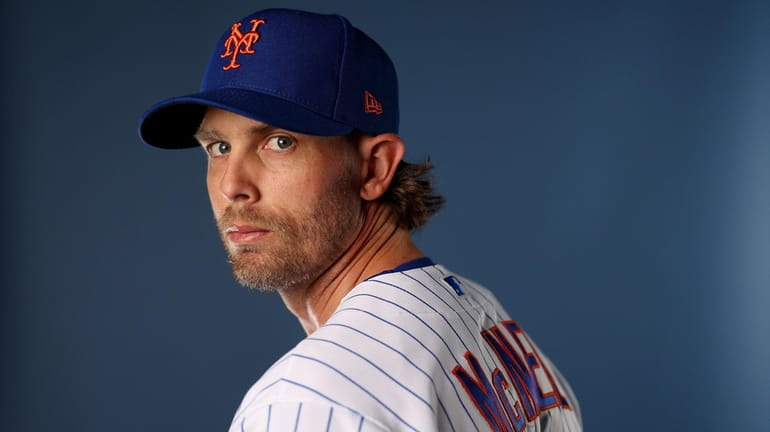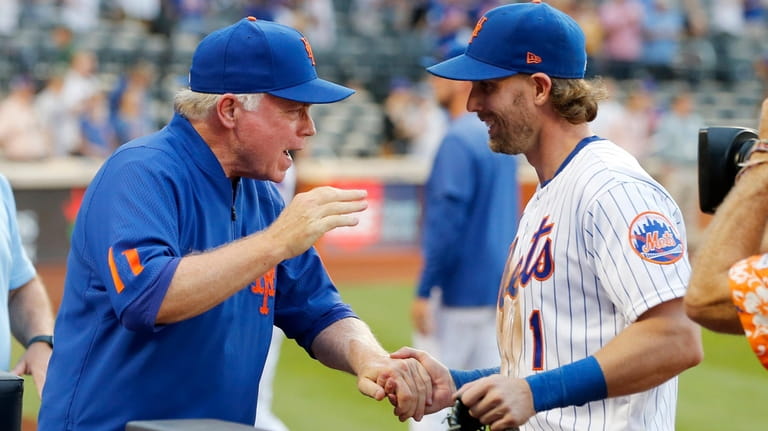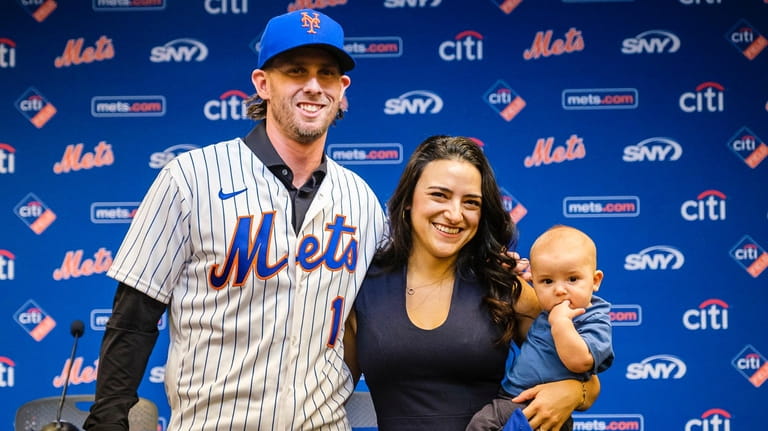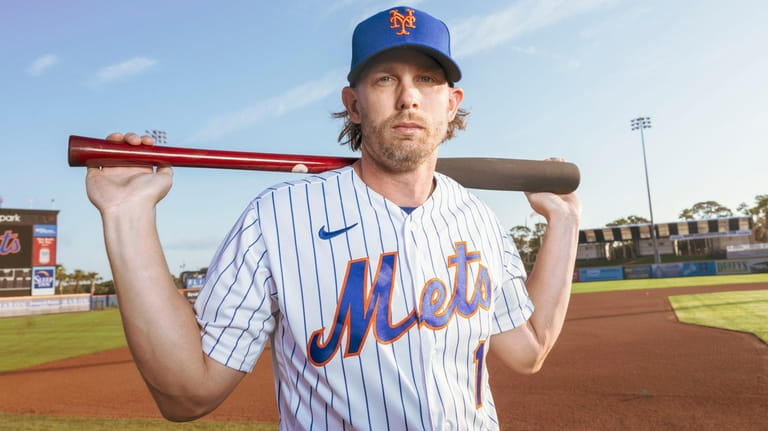Jeff McNeil opens up about his Mets turnaround: 'I thought there was a chance I wasn't coming back'

Jeff McNeil of the Mets poses for a portrait during Photo Day at Clover Park on Feb. 23 in Port St. Lucie, Fla. Credit: Getty Images/Elsa
PORT ST. LUCIE, Fla. — For Jeff McNeil, life is as good as it has ever been.
He is a new father and a batting champion. He received a contract extension during the offseason that afforded him great security, both financially and professionally. He also is representing his country as a member of the United States team competing in the World Baseball Classic, an acknowledgment of his status as one of the current best American-born players.
“Everything,” he said recently, “is perfect.”
Eighteen months ago, though, the opposite was true. Near the end of the 2021 season, the worst year of his career, McNeil was outwardly miserable, full of doubt and unsure of his future with the Mets and baseball in general. He was a contact savant who stopped making contact, and he didn’t know why.
His struggles — and ensuing return to excellence — were representative of those endured by the franchise, which toiled during a false start of a new beginning under new owner Steve Cohen before finding its footing in the year and a half since.
In an interview with Newsday, McNeil opened up about that stretch — what went wrong, how he turned it around and why he thinks the best is yet to come.
“I had a great first couple of years and then you have some self-doubt. ‘Do I belong up here?’ All this kind of stuff. Everything just starts spiraling,” the 30-year-old second baseman said. “Going into the [new] season with a good mindset, I know I’m one of the better players in baseball. I just have to believe that.”
The bad: 2021
McNeil’s lowest low came in Milwaukee in September 2021. That was the weekend the Mets were mathematically eliminated from playoff contention, effectively ending a season in which they were atop the NL East for more than 100 days.
A year before they celebrated a playoff berth, coincidentally on the same field, they watched the Brewers clinch their own division title.
Before one game in that series, McNeil sat in the dugout with Dominic Smith hours before first pitch. The Mets had yet to reveal a lineup, even to those in it. They looked at each other and wondered: Were they supposed to play that day?
“It felt like the team didn’t have a lot of confidence in me, so I didn’t have a lot of confidence in myself,” McNeil said. “That’s tough to play with.”

Mets manager Buck Showalter and infielder Jeff McNeil celebrate after defeating Atlanta at Citi Field on Aug. 7, 2022. Credit: Jim McIsaac
The context of that moment, for McNeil and for the Mets, was messy.
He had started slowly in 2021, then got hot, hurt his hamstring and cooled off. During a game that May, he had a physical altercation in the dugout tunnel with Francisco Lindor, his new double-play partner. He wound up hitting .251 — a bizarre drop of 68 points from what had been his career mark.
The team fired its hitting coaches in May, stayed in first place through July, crumbled in August and then played out the string in September.
Organizational uncertainty included looming decisions regarding the general manager and manager positions, both of which already had turned over multiple times in the previous years. Along the way, “something felt off all year” for McNeil, he said. His swing wasn’t right and he missed Chili Davis, with whom he was close (and with whom he still speaks regularly, about life more than baseball).
When he started to struggle, he worried about what that would mean for his salary the next season, given that he was headed into his first year of arbitration. Everything spiraled — poor hitting made him stress more, which made him hit worse and created more stress.
Players sometimes spout clichés about staying even-keeled and not riding the proverbial roller coaster, and to some degree that is real. But that is less so with McNeil, whose emotions are more often visible. McNeil loves getting hits and despises making outs. His mood — back then especially — reflected as much, sometimes independent of the score that night. As he toiled that summer, a Mets official referred to him as “very much a golfer,” notably an individual sport and McNeil’s top hobby.
“I didn’t feel like myself. I don’t think I was in a very good place mentally,” McNeil said. “In ’21, I was finding other people to blame. This can’t be my fault. I was looking for help and it was hard to get to where I needed to be . . . I put a lot of pressure on myself. It was not a good place to be.”
A veteran of seeing his name in trade rumors, he wondered if it might really happen this time. Might the Mets dump him?
“I thought there was a chance I wasn’t coming back,” McNeil said. “New York is my home. This is all I know. This is where I want to be.”
Easing his fears near the start of the offseason: a dinner with newly hired general manager Billy Eppler. They got together — at the recommendation of McNeil’s agent, Joe Longo, a longtime acquaintance of Eppler’s — at a restaurant in Manhattan Beach. McNeil made the six-hour round trip to meet the boss in the final hours before the owners’ lockout of the players prohibited them from communicating for several months.

Jeff McNeil poses with his wife Tatiana and son Lucas during a news conference at Citi Field on Jan. 31 to announce his re-signing with the Mets. Credit: Jeff Bachner
At a quiet table in the corner, they covered a lot: their backgrounds, the 2021 Mets, Eppler’s vision for the team, and what McNeil would want in a hitting coach and manager. McNeil was an Eppler kind of player — scrappy, good hitter, defensively versatile — and Longo had told each they would like the other. They vibed.
“It was a very straight, direct, fun, honest, sincere conversation,” Eppler said.
Critically, they also discussed McNeil’s future, as Robinson Cano was due to come back from a PED suspension the next season.
“I straight-up asked him: Is there a possibility of a trade?” McNeil recalled. “He goes, ‘Yeah, there’s a possibility, but we like you. As of right now, I want to see you on this team playing second base every single day for us.’ Thanks for being honest. I hope to do the same.”
That became the seed of regrown confidence for the season to come.

Jeff McNeil poses for a portrait during Mets Photo Day at Clover Park on Feb. 23 in Port St. Lucie, Fla. Credit: Newsday/Alejandra Villa Loarca
The good: 2022
When McNeil showed up in 2022, he was upfront with new hitting coaches Eric Chavez and Jeremy Barnes, telling them: “I want to figure this out on my own in spring training. I want some guidance, but let me work for two or three weeks. I’ll come to you and bounce stuff off of you.”
And so he did, leading to great results almost immediately. He batted .328 in April, .311 in May and .339 in June. He was back to being Jeff McNeil, All-Star contact savant.
Those months were not without stress, though. He was away from his pregnant wife, Tatiana, for almost all of it. He left the team for three days for the birth of their son Lucas in July, which coincided with his worst hitting of the year (.208).
When he returned to the Mets — just hours after welcoming Lucas into the world and days before the All-Star Game — he was sort of freaking out, away from his family and slumping. Buck Showalter noticed and wanted to chat.
In his first year with the Mets, the manager did that periodically, giving McNeil a little touch-up as a person more than as a player, talking about golf or whatever else — “trying to get my mind off baseball,” as McNeil put it. Showalter would put the golf magazine he subscribed to on McNeil’s chair in the clubhouse just to give him something else to think about.
“It takes his mind off of ‘the world is coming to an end because I didn’t get three hits last night,’ ” Showalter said.
McNeil quickly came to appreciate Showalter because “he has your back,” he said, and is open to players’ ideas. So when he wanted to talk on the last day before the All-Star break, McNeil obliged.
“He called me into his office and goes, ‘What’s going on?’ ” McNeil said. “I’m like, ‘I’m kind of losing it right now.’ He goes, ‘Go enjoy it. You deserve to be an All-Star. Go enjoy it and enjoy your family and come back refreshed and ready to go.’ ”
Showalter said: “I just reminded him of everything he had to be thankful of. I told him at the time, [expletive], you got a chance to lead the league in hitting. I just didn’t want him to sit on where he was mentally for those four days . . . When you come back, I want you to take account of everything you’ve got to be thankful for. And I need you to come back and be Jeff McNeil.”
McNeil came back and got hot again — especially in mid-August after getting his finger stepped on, which changed his swing, and no, that didn't really make sense to him either. . On the final day of the regular season, he staved off the Dodgers’ Freddie Freeman (.325), finishing with a .326 average, the highest in the majors.
“Winning the batting title was my biggest individual goal. It’s the one award I can win, like I always say. I’m not going to lead the league in homers,” McNeil said. “I want to be better than anybody in the world at that skill. And I was last year.”
The contract: now
McNeil said he was open for years to a long-term contract. The Mets — whatever iteration of the front office existed at the time — never were into that idea. But when he and Eppler’s inner circle exchanged their desired salary figures at the Jan. 13 deadline, ostensibly setting them up for an arbitration hearing the next month, McNeil knew it would never get that far. They had stuff to talk about. There was a deal to be made.
Cohen called one day during negotiations, McNeil said, and told him: “We want to reward you for last year. You had a great year. We want to make sure you never have to worry about money.”
On Jan. 27, he and the Mets agreed to a four-year, $50 million deal with a team option for a fifth season. It was the first lengthy contract extension for a Mets position player since Juan Lagares in 2015.
The contract solidified him as a key member of a Mets core expected to be a perennial World Series contender and positioned him to stay with the Mets through his age-35 season. McNeil has a chance at being a career-long Met, a rare feat in franchise history.
With McNeil, a re-signed Brandon Nimmo (who was a free agent) and a re-signed Edwin Diaz (who wasn’t homegrown but had shown great improvement in New York nonetheless), the Mets made compensating in-house talent a priority in recent months.
“I kind of love what [Atlanta is] doing,” said McNeil, referring to the five-time defending NL East champions, who have made a habit of locking up stars on long-term deals. “They’re getting their young guys, they’re paying them money that will change their life, and they’re going out there and playing stress-free. I think there’s players that benefit from that.
“Before, you saw [Mets] guys leaving in free agency. But now with Steve, we got guys who want to be here and they’re taken care of. It’s a place to be.”
When he slumps, McNeil won’t need to worry about matters such as salary arbitration anymore. He can be normal mad about baseball instead of existentially mad about life.
“I was a 12th-round pick and signed for $50,000. Which is really nothing. Any kind of contract I got, I felt super- grateful. I’ve come a long way,” he said. “The whole contract thing is just going to help me out tremendously because I know I’m not going to be in those dark places. I’ll still get frustrated in a spring training game because I want to do well and hit, but just knowing that a bad day isn’t affecting any kind of pay is going to be big for me. I can go out there and play baseball and not worry about life down the line.”

